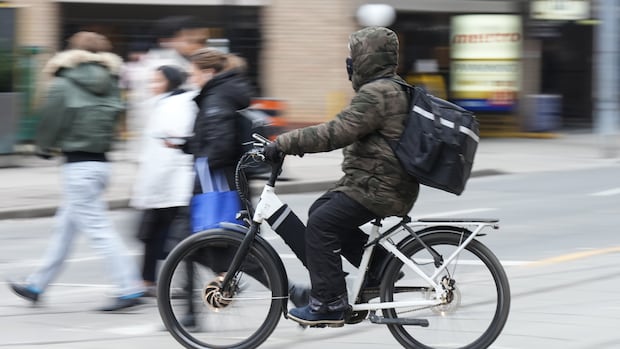Ottawa·NewAn expert panel is calling on the Ontario government to tighten its definition of what counts as an e-bike, in an attempt to improve safety and reduce the number of fatal crashes.Recommendations come in the wake of deaths on Ottawa-area roadsTrevor Pritchard · CBC News · Posted: Nov 27, 2025 4:00 AM EST | Last Updated: 30 minutes agoListen to this articleEstimated 4 minutesThe audio version of this article is generated by text-to-speech, a technology based on artificial intelligence.A food delivery courier rides an e-bike in Toronto last year. In the wake of several deaths, a new report out of Ontario’s office of the chief coroner is calling for changes to how e-bikes are defined in the province. (Chris Young/The Canadian Press)An expert panel is calling on the Ontario government to tighten its definition of what counts as an e-bike, in an attempt to improve safety and reduce the number of fatal crashes.That recommendation is one of seven found in a review of e-bike deaths that was prepared by Ontario’s office of the chief coroner and other stakeholders and released this week to the public.It emerged from work that began in 2021 by the Ottawa Fatal Collision Review Committee, a local group made up of police, public health officials, city staff and other experts.That year, the committee noticed there had been five recent local deaths involving e-bike riders:A man in his 60s who’d been hit by a car while turning at an intersection.A man in his 50s who lost control of his e-bike, jumped the curb and struck a light standard.A man in his 50s who was riding in a bike lane when he was hit by a car turning into a parking lot.A man in his 50s who crashed after swerving to avoid a pedestrian.A man in his 30s who ran into the back of an SUV.The report noted certain similarities in all the crashes, including that all the e-bikes appeared to have been modified “to increase their speed beyond design specifications.”Each e-bike was more akin to a motorcycle or moped and could not “be used as a pedal-assisted bicycle,” the report said. As well, three men had suspended licences at the time of their deaths, while the other two had previous suspensions, leading the report’s authors to suggest they were using e-bikes as “a substitute for a registered, licensed vehicle.”Four of the five also had drugs in their system when they died.”We noticed all those things, and we said, ‘Wait a minute, this is really concerning from a safety [perspective],'” said Dr. Louise McNaughton-Filion, regional supervising coroner for eastern Ontario. Would reduce e-bike weightUnder the current rules in Ontario, e-bikes cannot travel faster than 32 km/h, nor can they be modified to go faster than that. They can weigh up to 120 kilograms, however. The revised definition put forward in the report would more than halve that, cutting the maximum weight to just 55 kilograms. The report also urges Ontario’s Ministry of Transportation (MTO) to consider a separate classification for larger, motorcycle-style e-bikes, and potentially require their users to have a licence and insurance. (Currently, e-bike users do not need to be licensed.)It also calls for agencies to be more thorough and consistent when it comes to collecting and tracking statistics on e-bike injuries and fatalities.”If you are able to say that any vehicle …. that looks like a motorcycle or looks like a scooter is treated like a motorcycle or a scooter, that should resolve some of the problems,” McNaughton-Filion said.Despite the concerns, McNaughton-Filion says e-bikes have clear benefits, from reducing pollution to improving mobility.”You’ve got people who have heart conditions, lung conditions, knee replacements — they can now … enjoy being active,” she said. “The issue is making sure that people are also safe.”While the report was publicly released this week, McNaughton-Filion said the MTO and other agencies have been reviewing the recommendations.CBC reached out to the MTO for comment but did not hear back by deadline.ABOUT THE AUTHORTrevor Pritchard is the weekend assignment producer at CBC Ottawa, as well as a digital reporter and occasional newsreader. He’s previously reported in Toronto, Saskatoon and Cornwall, Ont.
Thursday, 5 Mar 2026
Canada – The Illusion
Search
Have an existing account?
Sign In
© 2022 Foxiz News Network. Ruby Design Company. All Rights Reserved.
You May also Like
- More News:
- history
- Standing Bear Network
- John Gonzalez
- ᐊᔭᐦᑊ ayahp — It happened
- Creation
- Beneath the Water
- Olympic gold medal
- Jim Thorpe
- type O blood
- the bringer of life
- Raven
- Wás’agi
- NoiseCat
- 'Sugarcane'
- The rivers still sing
- ᑲᓂᐸᐏᐟ ᒪᐢᑿ
- ᐅᑳᐤ okâw — We remember
- ᐊᓂᓈᐯᐃᐧᐣ aninâpêwin — Truth
- This is what it means to be human.
- Nokoma










